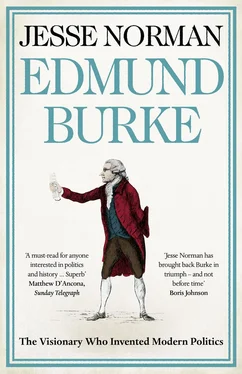There are many reasons for the recent neglect of Burke. He is not an executive politician, like a Pitt or a Peel, and his story is more one of intellect and imagination than of political achievement. His thought is multifarious and scattered across a vast array of pamphlets, speeches and letters, from which it must be quarried by the patient scholar. He is a master of English prose but remains somewhat alienated from current literary or academic debates, in part because he was a working politician, and so perhaps a victim of the distaste that politics often inspires. And he deliberately withholds himself: as he wrote at the age of sixteen to his best friend Richard Shackleton, ‘We live in a world in which everyone is on the catch, and the only way to be safe is to be silent, silent in any affair of consequence, and I think it would not be a bad rule for every man to keep within what he thinks of others, of himself, and of his own affairs.’ Burke’s speeches, his writings and even his letters are notably short on confidences, gossip or personal colour. This is far removed from the modern confessional style.
Moreover, although few more quotable writers have ever existed, Burke himself and his ideas resist brief summary. Even sympathetic readers have seen him as an enigma or a contradiction. They have struggled to understand how he could be both a supporter of the American colonists and a critic of the French revolution; how he could staunchly argue for the established order, yet defend dissenters and Catholics and alienate the Crown; how he could both dismiss abstract rights and insist upon the importance of rights within the rule of law.
For their part, his many critics have accused him of incoherence, hypocrisy, even madness. In particular, for Thomas Paine, and then Karl Marx, Burke is a placeman, a paid propagandist and an apologist for aristocracy and privilege. Such claims were echoed in the twentieth century by the influential historian Lewis Namier and his followers, who generally took a narrow and cynical view of Burke’s achievements as a thinker and statesman. Even today, it is striking how much the philosopher Alasdair MacIntyre, for example, owes intellectually to Burke, even while he belittles Burke’s ideas. Those who attend to Burke’s life often detect inconsistency, because they ignore the deeper consistency of his thought.
But on the other side of the argument such has been Burke’s status, especially among conservatives, that his life has regularly been co-opted for political purposes. In the 1830s Disraeli claimed to identify a Tory line of succession including Burke and culminating by implication in himself, only to exclude Burke (and Peel) after he was refused office by Peel in 1841. In the USA, Presidents Woodrow Wilson and Theodore Roosevelt were happy to count Burke their ally, as did a generation of anti-communists during the Cold War and again after the fall of the Iron Curtain. And at a far less exalted level, one way to read the present book is as a modern Appeal from the Old to the New Whigs (sic).
Burke has been well served by his biographers over the years, including James Prior and John Morley in the nineteenth century; Philip Magnus, Carl Cone, Russell Kirk, Stanley Ayling and Conor Cruise O’Brien in the twentieth; and most recently F. P. Lock. To them the present volume owes an enormous debt of gratitude, and to Lock’s authoritative two-volume study of 1998–2006 in particular. The same is true of the work of many scholars listed in the Acknowledgements, Notes and Bibliography.
This book is not a work of primary research, though it incorporates some important recent discoveries. Rather, it is a personal interpretation of Burke’s life and thought, which draws heavily on my own background in philosophy and experience as a working politician. It seeks not merely to present Edmund Burke as a man, and to trace his life against the astonishingly rich tapestry of eighteenth-century society, but to make the case for him as a statesman and thinker. It is short and inevitably selective, and this risks underplaying both conflict and development in Burke’s ideas; but its argument is for a deeper coherence. Somewhat unusually, the book is structured in two parts, Life and Thought, so that the interested reader can enjoy his life for its own sake, and engage with Burke’s thought with the wider context of his life and society already in hand. My hope is to start to do for Edmund Burke what others have done for Adam Smith over the past thirty years: to recognize him publicly as one of the seminal thinkers of the present age.
The political theorist Harold Laski once said of Burke:
He brought to the political philosophy of his generation a sense of its direction, a lofty vigour of purpose, and a full knowledge of its complexity, such as no other statesman has ever possessed. His flashes of insight are things that go, as few men have ever gone, into the hidden deeps of political complexity … He wrote what constitutes the supreme analysis of the statesman’s art.
The purpose of this book is to explain how he came to write it, why it is, and why he and it matter today.

PART ONE
Конец ознакомительного фрагмента.
Текст предоставлен ООО «ЛитРес».
Прочитайте эту книгу целиком, купив полную легальную версию на ЛитРес.
Безопасно оплатить книгу можно банковской картой Visa, MasterCard, Maestro, со счета мобильного телефона, с платежного терминала, в салоне МТС или Связной, через PayPal, WebMoney, Яндекс.Деньги, QIWI Кошелек, бонусными картами или другим удобным Вам способом.













